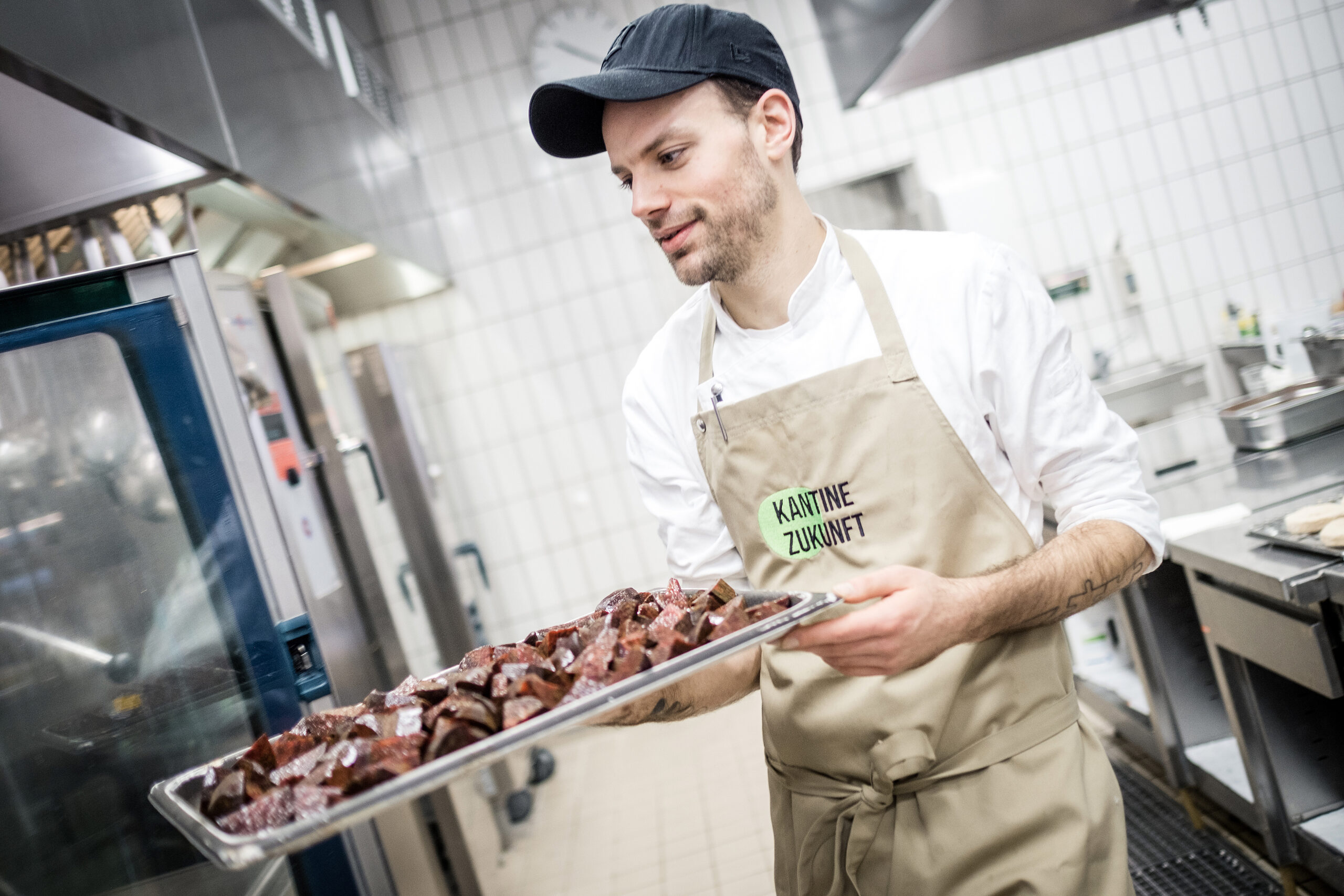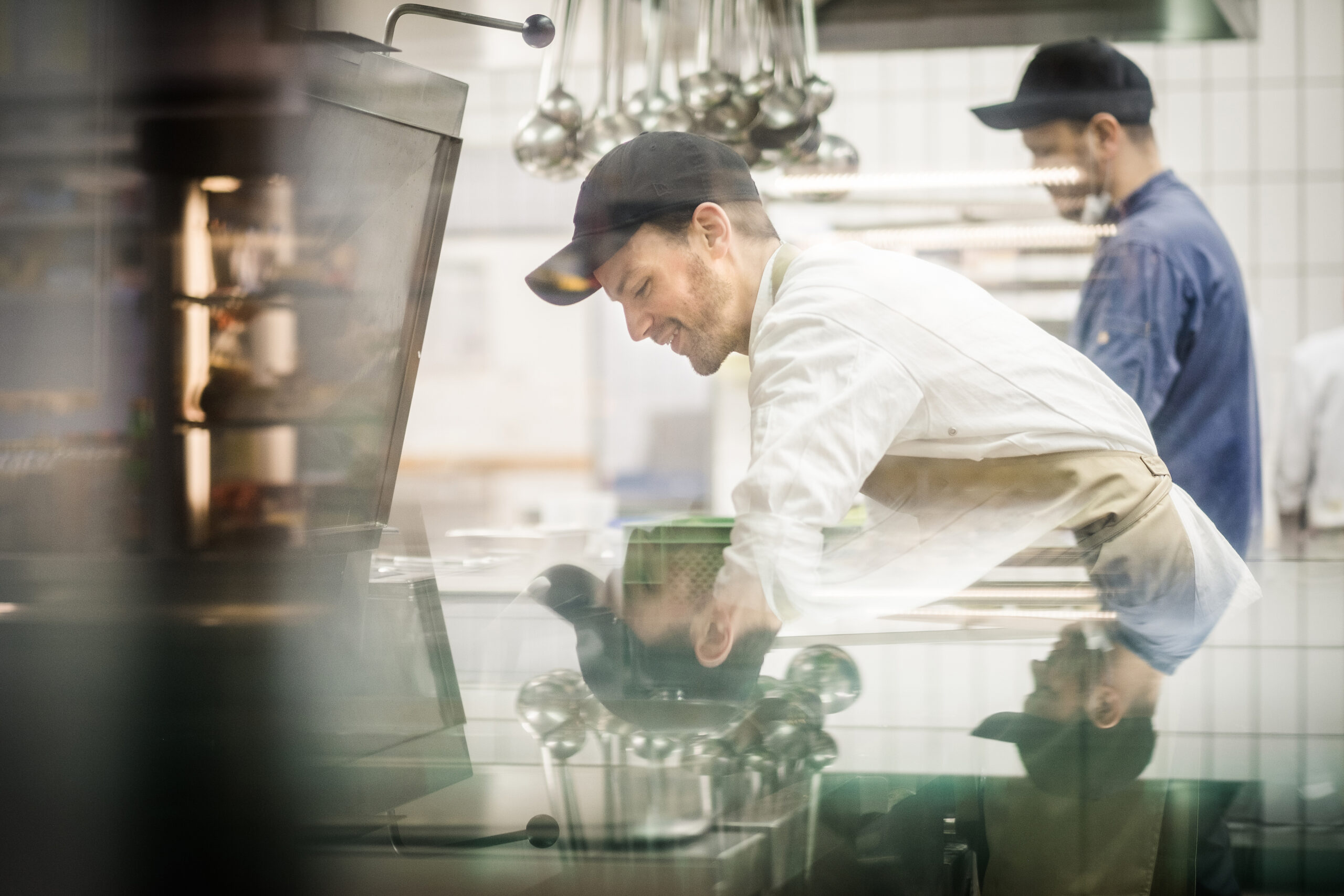Patrick Wodni

Patrick Wodni works as deputy project manager of Kantine Zukunft with canteens across Berlin to transform the way they cook and source ingredients. We speak with Patrick about the importance of good community catering, how freedom can lead to creativity, and a general appreciation and understanding of food.
Patrick, what changes are you striving for in the canteen kitchens?
In essence, this simply means a much higher organic content and, of course, a different taste value of the food, but above all more craftsmanship.
How do you then proceed with the projects in concrete terms?
At the beginning, we make a kind of inventory that refers to the processes, procedures, key figures, in other words, everything we need to understand the operation. And then we work a few shifts to see where we are and who we are dealing with. That’s important in order to be able to have some say in what day-to-day operations look like, although of course you can’t experience and reproduce all the processes one hundred percent within a few days. But you get a good overview and learn a lot about the kitchen. We then do a workshop together with the kitchens to find a strategy and set realistic goals. After that, we start working together.
Before you worked in community catering, you worked in star gastronomy for a few years. What made you decide to become a chef?
I was never particularly good at school, so a manual apprenticeship, where you get discipline along the way, was definitely the right thing for me. I always cooked a bit out of necessity, but at some point, I realized that I really enjoyed it. My mother was a single parent and worked, so I always cooked when I came home from school, so we could eat together as soon as she got home.
And when did you realize that certain things were going wrong within the catering industry?
That was in batches. I had my first moments of realization after my training, because I questioned a lot of what I experienced there on a weekly basis. Both the way they treated each other and the huge amounts of food that were thrown away every day – it was almost an entire breakfast buffet that went into the bin every day. The inconsiderate treatment starts with the fact that someone who works for a company brings a truck full of food that neither they nor I have any connection to. But then I had to deal with it, I thought it was kind of weird. There were many different things that made the profession a bit bad for me, because in the end it was always about the wrong thing for me, namely primarily about profit. The companies should be able to make that, but it can also be accompanied by constructive questions.
I have often been misunderstood in the past when I have said that I am really fed up with the decadence of gastronomy. This does not refer to delicacies and high-priced star menus, but to the fact that it is tragic when people buy cheap food and throw half of it away. For me, that’s decadence.
Almost everything can be recycled in some way, be it chips made from potato peelings.
No. The most important economic factor in the kitchen is always time, each employee simply costs a lot of money for the time he/she is there. If I need crisps, I buy them instead of having an employee make them. Economically, it is cheaper to throw away leftovers and buy new things.
Time is of the essence; most canteens are about getting enough to eat rather than implementing new ideas or offering nutritious food.
It’s really very, very little about having really good food. That’s a paradox, because for many people, lunch in the canteen, for example, is the most important meal of the day, from which they have to draw a lot of energy to get through the day.
What approaches do you think society needs, to break these patterns?
I would directly ask the counter-question: What is the first thing that goes through your mind when you hear the words canteen or canteen cook?
Mass processing. And hot food.
And that is certainly the case for many. This profession receives little or no appreciation, as the prevailing opinion mostly reduces it to its mere function. There is not much room for creativity or own ideas, often there are very strict, entrenched structures. In addition, the kitchens have to abide by a multitude of regulations in order to be as standardized as possible, so that the company’s controlling department is in control respectively. All this doesn’t sound like a very congenial workplace, especially not for those who want to work creatively. So, if as a cook I am only supposed to perform one function and there is no room for anything creative or exciting, then this is simply not the right place for most cooks.
Well, the first step would be to give the people who work there more room for their own ideas?
Definitely. The companies should think hard about how they can give the cooks more freedom so that they enjoy their work and can call what they do cooking with a clear conscience. I don’t know of any craft that has been so alienated from itself over the decades. So much work has been outsourced and externalized – instead of peeling vegetables, you get them from the freezer these days.
“The canteens and cafeterias in Berlin are basically the biggest restaurants in the city, they have the most purchasing power. So, they absolutely have to play a role in the topic of regional and the question of where we source our products – that then, it can really mean a change for the region.”
Executing your own ideas costs more money, as we just talked about. How do you try to implement this to enforce this concretely?
Within our analysis, we prepare all costs, recently we did this for an entire year, which was incredibly time-consuming. This analysis clearly shows how much money was spent on what – at this point we approach the kitchens. The first reaction is usually: That can’t be. A shifted perception comes together with indignation, from which, however, a kind of spirit of optimism often arises. Before we can implement all the possible changes in the kitchens, we calculate them together. Products of better quality and organic food always seem to be more expensive at first – but if I change the menu, for example by using less meat, in many cases I get by without additional costs in the calculation. Often the problem is that the conversion to organic products is done on a one-to-one basis, through the same source from which the previous goods were purchased. If I order organic products from conventional wholesalers who do not specialize in organic products at all, I always pay more.
Now that I have learned a lot about you and your work, I would like to talk about Die Gemeinschaft. Why did you become a member?
At some point, Micha called me in the middle of the night and asked if I would like to become a member. At that time, I had already been following the association with interest and had often exchanged views with Micha and Billy on the topics that also take place in the community. The canteens and cafeterias in Berlin are basically the biggest restaurants in the city, and they have the most purchasing power. So, they absolutely have to play a role in the topic of regional and the question of where we get our products from – that can really mean a change for the region. On the one hand, it has to be made possible for the large kitchens in their internal structures to source regional organic products, but on the other hand, delivery and logistics possibilities have to be created. Discussing these possibilities within the community and looking for solutions was the exciting part for me.
About change, what points do you think urgently need to change within community catering in general?
Too many people are satisfied with mediocrity in communal catering, and I think that’s a shame. You can also demand certain things in canteens. The usual things, like low prices, a quick satiety for many – where is the food quality or a proper preparation of the food? They don’t appear at all. Technically, it is progress to pre-cook food and then preserve it for three weeks, as some large catering companies do. But on all other levels, it’s clearly a step backwards. I don’t think it’s a good solution to keep taking the kitchens out of the facilities and outsourcing them, because you lose an awful lot that way. How can you introduce pupils to food, for example, so that they don’t meet it with rejection? Only by cooking in the house, by making it smell like food. If sensory experiences are missing, a lot falls by the wayside.
Thus what really needs to change is the appreciation of food quality and the perception of food in everyday life. Food should not be something mediocre for mere satiety. You spend too much time in life eating for that. It’s totally worth it to at least get to grips with the basics of it.
Photos
Insa Hagemann
